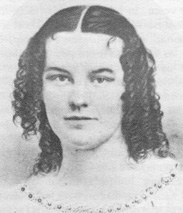![]()
 |
Rebecca Harding Davis: Selected Secondary Bibliography (updated 5/22/12) Chronology of works and brief biographical sketch from answers.com Picture courtesy of Legacy's American Women Writers Site |
Works Available Online (Note: Links in BOLD lead to page images at MOA) "Life in the Iron Mills" (from Project Gutenberg)
Doctor Warrick's Daughters (novel; 1896) John Andross (1874) (at Google Books) Kent Hampden (adolescent novel; 1892) (at Google Books)
--A Story of To-Day. Atlantic Monthly 8, no. 48 (October 1861): 471-486. Part 1. Silhouettes of American Life (1892) (at Google Books).
Some
Testimony in the Case (Atlantic, Nov. 1885)
Waiting for the Verdict (novel; 1868) (Google books) Davis on Hawthorne, Emerson, and Bronson Alcott (pp. 33-37 from Bits of Gossip) I remember listening during one long summer morning to Louisa Alcott's father as he chanted pæans to the war, the "armed angel which was wakening the nation to a lofty life unknown before." We were in the little parlor of the Wayside, Mr. Hawthorne's house in Concord. Mr. Alcott stood in front of the fireplace, his long gray hair streaming over his collar, his pale eyes turning quickly from one listener to another to hold them quiet, his hands waving to keep time with the orotund sentences which had a stale, familiar ring as if often repeated before. Mr. Emerson stood listening, his head sunk on his breast, with profound submissive attention, but Hawthorne sat astride of a chair, his arms folded on the back, his chin dropped on them, and his laughing, sagacious eyes watching us, full of mockery. I had just come up from the border where I had seen the actual war; the filthy spewings of it; the political jobbery in Union and Confederate camps; the malignant personal hatreds wearing patriotic masks, and glutted by burning homes and outraged women; the chances in it, well improved on both sides, for brutish men to grow more brutish, and for honorable gentlemen to degenerate into thieves and sots. War may be an armed angel with a mission, but she has the personal habits of the slums. This would-be seer who was talking of it, and the real seer who listened, knew no more of war as it was, than I had done in my cherry-tree when I dreamed of bannered legions of crusaders debouching in the misty fields. Mr. Hawthorne at last gathered himself up lazily to his feet, and said quietly: "We cannot see that thing at so long a range. Let us go to dinner," and Mr. Alcott suddenly checked the droning flow of his prophecy and quickly led the way to the dining-room. Early that morning when his lank, gray figure had first appeared at the gate, Mr. Hawthorne said: "Here comes the Sage of Concord. He is anxious to know what kind of human beings come up from the back hills in Virginia. Now I will tell you," his eyes gleaming with fun, "what he will talk to you about. Pears. Yes. You may begin at Plato or the day's news, and he will come around to pears. He is now convinced that a vegetable diet affects both the body and soul, and that pears exercise a more direct and ennobling influence on us than any other vegetable or fruit. Wait. You'll hear presently." When we went in to dinner, therefore, I was surprised to see the sage eat heartily of the fine sirloin of beef set before us. But with the dessert he began to advocate a vegetable diet and at last announced the spiritual influence of pears, to the great delight of his host, who laughed like a boy and was humored like one by the gentle old man. Whether Alcott, Emerson, and their disciples discussed pears or the war, their views gave you the same sense of unreality, of having been taken, as Hawthorne said, at too long a range. You heard much sound philosophy and many sublime guesses at the eternal verities; in fact, never were the eternal verities so dissected and pawed over and turned inside out as they were about that time, in Boston, by Margaret Fuller and her successors. But the discussion left you with a vague, uneasy sense that something was lacking, some back-bone of fact. Their theories were like beautiful bubbles blown from a child's pipe, floating overhead, with queer reflections on them of sky and earth and human beings, all in a glow of fairy color and all a little distorted. Mr. Alcott once showed me an arbor which he had built with great pains and skill for Mr. Emerson to "do his thinking in." It was made of unbarked saplings and boughs, a tiny round temple, two storied, with chambers in which were seats, a desk, etc., all very artistic and complete, except that he had forgotten to make any door. You could look at it and admire it, but nobody could go in or use it. It seemed to me a fitting symbol for this guild of prophets and their scheme of life.
|
|